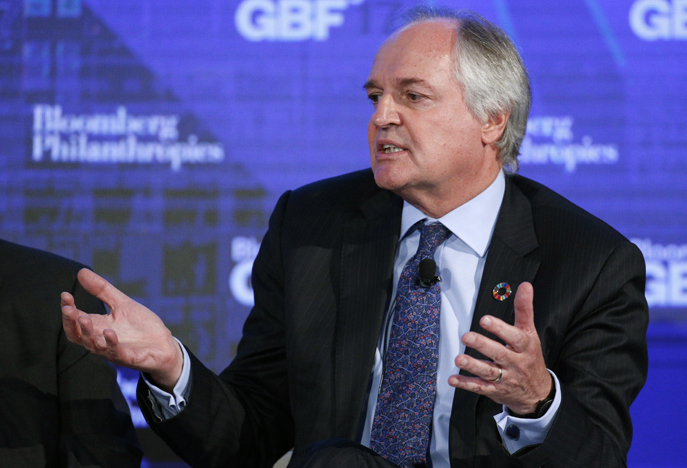Richard Howitt of Frank Bold LLP draws lessons from last month’s Sustainability Reporting and Communications Summit on the continuous loop of implementation and evaluation that ensures purpose is “lived” within a company
What does the drive for companies to articulate their purpose mean for those already committed to promoting sustainable and responsible business? The first answer should be: very little.
So far, so good for more than 2,000 representatives virtually assembled earlier this month for the Sustainability Reporting and Comms Summit Europe 2020, which I was pleased to be involved in as both moderator and panellist.
In the opening session on Purpose-Driven Reporting (see video below) I was on a panel with Hadewych Kuiper, commercial director, Triodos Investment Management; Paul Druckman, chair of the World Benchmarking Alliance; and Dr Gemma Cranston, director of business and nature, Cambridge Institute for Sustainability Leadership.
The statement of purpose itself involves some honest soul-searching
As was pointed out during the session, a simple reading of last year’s Business Roundtable statement – where the debate about corporate purpose moved into the mainstream – shows that its definition of purpose was one of serving all stakeholders.
Any company proclaiming to be a sustainable business that does not already define, consult, analyse and report its impact on stakeholders is probably one that is not serious about sustainability in the first place.
But for companies that have already largely embraced the stakeholder model, this becomes a question of using the process of defining corporate purpose to mobilise collective will within the company towards its broader role in the economy and in society.
It begins with the statement of purpose itself, which involves some honest soul-searching inside and outside of the company. The sustainability function will often already have the cross-cutting relationships to enable this to happen.
Anything less than this simply risks the accusation of greenwashing being translated into one of purpose-washing by the firm.
But for all the soul-searching, can companies really be described as having a soul?
Irrespective of your religious convictions or otherwise, these debates inevitably bring us into the spheres of morals, ethics and values, potentially very challenging to conventional thinking in the boardroom or the executive suite.
Once again, it is often the sustainability professional who is adept at managing boundaries for the company and of being able to challenge existing mindsets in the interests of the long-term success of the company itself.
So a sustainable business already has the competences and capacity to engage successfully in corporate purpose.
But if the purpose debate is to build on, not replace, existing efforts on sustainability, the summit went on to debate: what is different?
A key aspect of corporate purpose is what the company chose not to do because it was inconsistent with its values
First, it is not simply about the fact that a company has made a statement of purpose, but the process by which it is drawn up and articulated, with a continuous loop of implementation and evaluation that ensures purpose is “lived” within a company.
That also means having the company’s statement up front in company reports, with subsequent cross-references to analyse its relevance at key points through the report itself.
For many of us, that involves measuring actual value to different stakeholders created by the company and being willing to be transparent about where the company is falling short.
A key aspect of corporate purpose is not what the company does, but what it doesn’t do: which investment projects, which expansion into new markets, which acquisitions did not take place because they were inconsistent with the company’s values.

For business leaders who are now saying the principle of “shareholder primacy” no longer applies, (the idea that shareholder interests override those of other stakeholders), do you honestly say this in your communications to shareholders and in your financial reporting?
Paul Polman did when he was at Unilever, and companies need to develop the courage to expect that their investors have long-term as well as short-term objectives, and values alongside their desire for financial returns.
In addition, does the company demonstrate its values in the way it treats its employees, customers, suppliers and local communities?
For companies to be able to proclaim a single purpose requires the coherence that comes from addressing its culture, and it must be consistent with it.
I expect the focus on purpose to prompt a rise in activism by companies in the public space
I also expect the focus on purpose to prompt a rise in activism by companies in the public space, on issues complementary to the values they espouse.
This goes beyond philanthropy to advocacy, with companies aligning themselves to public campaigns and adopting causes, following the example of companies like The Body Shop in the United Kingdom, Mercedes-Benz and Estée Lauder across Europe, American Express and Ben and Jerry’s in the United States.
Indeed, it will be interesting to see how many mainstream companies follow the example of Danone and convert themselves into Benefit Corporations, requiring them to change their articles of association to reflect their purpose in wider society.
The Purpose of the Corporation project, run by the law firm Frank Bold, for whom I work, and the Cass Business School, suggests it is only a matter of time before these considerations are built in to changed corporate governance rules in different jurisdictions internationally, ultimately affecting all companies.
Having addressed the “why”, speakers at last month’s conference also addressed the “what” and the “where”.
The panel on focusing on the right frameworks to align with the needs of stakeholders gave a clear message that companies have to make choices between different reporting frameworks, and from within them.
Hilde Blomme, deputy chief executive of Accountancy Europe, spoke about how report preparers are open to different frameworks, but that clarity in choosing a single framework is essential to support the move towards more auditing and assurance of non-financial data.
The conference also heard about the different attempts taking place in Europe and internationally towards the aim of a single, standardised sustainability framework, connecting financial and non-financial reporting.
The momentum for this was clear, and is underlined by the publication of Common Metrics for Stakeholder Capitalism by the World Economic Forum during Climate Week New York.
Helena Viñes Fiestas from BNP Paribas, a member of the technical expert group which produced the EU Taxonomy on Sustainable Activities, made the point that this is not “just another framework”. It is a decisive step in determining what can and cannot be classified as green investment, products or services.
There is urgency in how companies are surviving Covid-19, but also their preparedness for future shocks
The presence of even more investors this year was also notable, with speakers from Brunel Pension Partnership, Invesco and Newton Investment telling the summit that it is not just about companies providing the right data, but how investors then translate the information into decision-making.
For them, there is urgency in how companies are surviving the Covid-19 crisis, but also what that says about the company’s resilience and preparedness for future shocks.
Meanwhile, Michael Beutler, director of sustainability operations for luxury goods company Kering argued that the latest technologies make transparency ever-more possible.
In a summit that heard the refrain “data is king”, it was also interesting to moderate a session entitled “Information does not always guarantee insight”.
To raise the bar for all of us on what is possible, Neil Brown from specialist environmental investor Earth Capital showed how it is able to measure impact over the entire supply chain of companies and lifecycle of products; Eoin Fahy of KBI Global Investors explained how his company analyses every revenue line of a company for its impact on the Sustainable Development Goals (SDGs).
Which brings us back to purpose. I wonder whether the SDGs haven’t already delineated the debate on purpose, challenging the company to do its bit to deliver the Global Goals?
Of course, all of this is dependent, too, on the commitment to purpose being genuine and meaningful.
Trust in corporates will only be restored if our efforts are authentic
Corporate purpose has risen as an issue, largely in response to widespread evidence of loss of trust in business. That trust will only be restored if our efforts are authentic.
At the summit’s closing session on communicating purpose, Ynzo van Zanten of Tony's Chocolonely said that it is “changing the chocolate industry from the inside”, whilst Kai Rolker of Clariant showed how the chemicals company measures value for stakeholders and seeks to beat other companies in doing so.
There has always been the notion that the sustainability professional is an insurgent inside the company. In the purpose debate, perhaps that will start to apply to entire companies in their sector and in the economy as a whole.
It is such real-life examples that always illuminate these gatherings.
They also demonstrate that purpose is not the same as strategy. Yes, it must give meaning to the company’s strategy and business model. But it also looks beyond the framework of economics.
Purpose is about what the organisation stands for in historical, ethical, emotional as well as strategic terms. Yes, after two days of reflection together, I have to conclude that the company must have a soul.

Richard Howitt is senior associate at the international law firm Frank Bold LLP and was former chief executive officer at the International Integrated Reporting Council and Member of the European Parliament. Twitter: @richardhowitt

